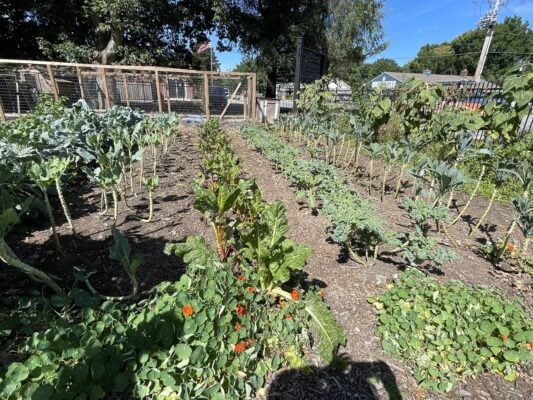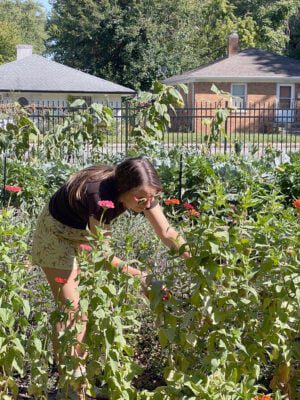Restaurateur and philanthropist Martha Hoover is the visionary behind the well-known Cafe Patachou restaurant, ushering in a trend toward locally-sourced high quality foods.
Hoover’s values-driven business model led to what is now known as A Longer Table, an organization with a mission to end food insecurity, starting with what students eat at school.
When A Longer Table partners with local schools, big changes are underway. In addition to the new menu and nutritious meals, the organization provides staff training and thriving-wage jobs. They also remodel the kitchens to transition from traditional heat-and-serve meal preparation to a fully functioning kitchen where trained staff make made-from-scratch meals daily.
A Longer Table prioritizes listening to their communities by hosting focus groups with students and stakeholders to select the upcoming menu items.
In part two of this exclusive interview, Hoover sat down with the Recorder to share how A Longer Table is changing school cultures and plans to expand beyond Indiana.
This Q&A has been edited for length and clarity.
When you think about the experiences of some of the students and families, staff, people in the cafeterias, what stands out for you?
Hoover: Oh, I think the dedication. Well, the kids are amazing. Their openness and willingness to try things, to do things. You ask a kid a question, they’re going to give you an honest answer and I love that about them.
But the people who I have been so impressed with are the cafeteria workers and the school staff, the school leaders and executive teams who understand that food is critical to a child’s success in life and they are not willing to just check off a box and take the easiest solution. They know that they have to completely change the school’s mindset about what a quality food program in their school, what it does to change the entire vibe at the school.

Are there some favorite meals that kids have talked about over the years?
Hoover: The love anything Asian-inspired. They love the sesame noodles, which is a vegetarian dish that they just adore. They went from saying pizza and hot dogs are our favorite meals to going, when are we going to have roasted chicken with sesame noodles with cabbage and sweet peas?
Shannon (Mitchell), our chef at a longer table, does a remarkable amount of research and works with the communities regarding the menu planning, and all of our recipes meet federal standards. But she does it in such an innovative and interesting, very, very imaginative way.
You know what else our kids love? They love the salads. And it’s not because it’s loaded with fake ranch dressing. They love their salads because it’s crispy, good vegetables and they adore it.
I imagine students who were able to grow and eat through school partnerships with A Longer Table, having access to healthier meals, have a sense of dignity and pride.
Hoover: And you know what else it does? We are very student-focused, but this also removes a burden from the parents. Because I have yet to meet a parent that does not want a better life for their child than they have. These parents whose children we are serving want what’s best for their child. So, this also has a ripple effect for the whole family. It relieves the parents from worrying that what their kid’s getting is just empty calories.
Fifty percent of (a student’s) food comes from school. They want to know that their kids are getting the best that they can get. Now, that doesn’t mean filet mignon, but it means high-quality, scratch-made meals. And that’s what we’re serving.
When you think about who this food preparation model could work for, who do you think about?
Hoover: Honestly, I think it should and could work in every school, particularly every private school.
Our program does not cost the school any more money to purchase food than they’re already purchasing. We just do it better. We do it more efficiently, and we do it at a higher quality.
I’ve always said, if you’re going to dream, dream big. The big dream for A Longer Table is to be a national model of what schools can do.
What are you most proud of as it pertains to this philanthropic work?

Hoover: What I’m most proud of is that this organization has evolved and it’s evolved openly and willingly to better serve our community.
We didn’t know enough about hunger relief and what the issues were. We didn’t know what the needs of the community were when we started. But before we were willing to pat ourselves on the back, we decided to start measuring impact.
We have a team here at A Longer Table that is remarkable at looking at the data, understanding what it means and how to actually do things better. Not just more efficiently, but better so that there are better outcomes at all times.
At some point, we need to solve a problem. We can’t just keep plugging in holes. Let’s try to solve this because in our theory, if a child has better educational outcomes, better health outcomes, fewer disciplinary issues, that also tracks with higher education outcomes, right?
What we know is that in the schools in which we operate, attendance is significantly better.
I mean, you can’t educate kids if they don’t go to school. The fact that attendance is better, and we can measure that, is as impressive as anything. Kids want to learn. I believe that kids really deserve this better life.

You’re thinking about expanding nationally with A Longer Table?
Hoover: I think before we even go national, we need to go statewide. We need to go regionally. I believe in smart, slow, strategic growth.
We are poised to have three additional schools by the end of the 2026 school year. We’re very excited about that growth. We’re a small organization. We take things slowly.
We want to make sure that our partner schools are not just asking us to check off a box, but that they are truly aware of the impact of our work and that they buy into it. It’s got to be part of the school culture.
Read part one of this exclusive interview here.
For more information, visit alongertable.org.
Camike Jones is the Editor-in-Chief of the Indianapolis Recorder. Born and raised in Indianapolis, Jones has a lifelong commitment to advocacy and telling stories that represent the community.








